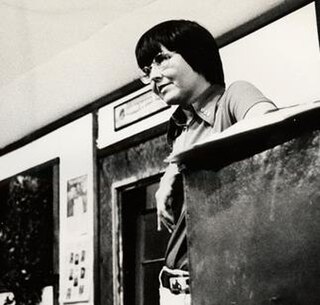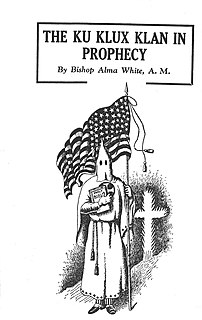Related Research Articles
Feminist theology is a movement found in several religions, including Buddhism, Hinduism, Sikhism, Neopaganism, Baháʼí Faith, Christianity, Judaism, Islam, and New Thought, to reconsider the traditions, practices, scriptures, and theologies of those religions from a feminist perspective. Some of the goals of feminist theology include increasing the role of women among clergy and religious authorities, reinterpreting patriarchal (male-dominated) imagery and language about God, determining women's place in relation to career and motherhood, studying images of women in the religions' sacred texts, and matriarchal religion.

Donna J. Haraway is an American Professor Emerita in the History of Consciousness Department and Feminist Studies Department at the University of California, Santa Cruz, United States. She is a prominent scholar in the field of science and technology studies, described in the early 1990s as a "feminist and postmodernist". Haraway is the author of numerous foundational books and essays that bring together questions of science and feminism, such as "A Cyborg Manifesto: Science, Technology, and Socialist-Feminism in the Late Twentieth Century" (1985) and "Situated Knowledges: The Science Question in Feminism and the Privilege of Partial Perspective" (1988). Additionally, for her contributions to the intersection of information technology and feminist theory, Haraway is widely cited in works related to Human-Computer Interaction (HCI). Her Situated Knowledges and Cyborg Manifesto publications in particular, have sparked discussion within the HCI community regarding framing the positionality from which research and systems are designed. She is also a leading scholar in contemporary ecofeminism, associated with post-humanism and new materialism movements. Her work criticizes anthropocentrism, emphasizes the self-organizing powers of nonhuman processes, and explores dissonant relations between those processes and cultural practices, rethinking sources of ethics. Haraway criticizes the Anthropocene because it generalizes us as a species. However, she also recognizes the importance of it recognizing humans as key agents. Haraway prefers the term Capitalocene which defines capitalism's relentless imperatives to expand itself and grow, but she does not like the theme of irreversible destruction in both the Anthropocene and Capitalocene.

Dorothy Day was an American journalist, social activist and anarchist who, after a bohemian youth, became a Catholic without abandoning her social and anarchist activism. She was perhaps the best-known political radical among American Catholics.
Equality feminism is a subset of the overall feminism movement and more specifically of the liberal feminist tradition that focuses on the basic similarities between men and women, and whose ultimate goal is the equality of the sexes in all domains. This includes economic and political equality, equal access within the workplace, freedom from oppressive gender stereotyping, and an androgynous worldview.
The history of feminism comprises the narratives of the movements and ideologies which have aimed at equal rights for women. While feminists around the world have differed in causes, goals, and intentions depending on time, culture, and country, most Western feminist historians assert that all movements that work to obtain women's rights should be considered feminist movements, even when they did not apply the term to themselves. Some other historians limit the term "feminist" to the modern feminist movement and its progeny, and use the label "protofeminist" to describe earlier movements.

Mary Daly was an American radical feminist philosopher, academic, and theologian. Daly, who described herself as a "radical lesbian feminist", taught at the Jesuit-run Boston College for 33 years. Daly retired in 1999, after violating university policy by refusing to allow male students in her advanced women's studies classes. She allowed male students in her introductory class and privately tutored those who wanted to take advanced classes.

Womanism is a social theory based on the history and everyday experiences of black women. It seeks, according to womanist scholar Layli Maparyan (Phillips), to "restore the balance between people and the environment/nature and reconcil[e] human life with the spiritual dimension". Writer Alice Walker coined the term "womanist" in a short story, "Coming Apart", in 1979. Since Walker's initial use, the term has evolved to envelop varied, and often opposing, interpretations of concepts such as feminism, men, and blackness.
New feminism is a form of Christian feminism that emphasizes the integral complementarity of women and men, rather than the superiority of men over women or women over men, and advocates for respecting persons from conception to natural death.
Socialist feminism rose in the 1960s and 1970s as an offshoot of the feminist movement and New Left that focuses upon the interconnectivity of the patriarchy and capitalism. However, the ways in which women's private, domestic, and public roles in society has been conceptualized, or thought about, can be traced back to Mary Wollstonecraft's A Vindication of the Rights of Woman (1792) and William Thompson's utopian socialist work in the 1800s. Ideas about overcoming the patriarchy by coming together in female groups to talk about personal problems stem from Carol Hanisch. This was done in an essay in 1969 which latter coined the term 'the personal is political.' This was also the time that second wave feminism started to surface which is really when socialist feminism kicked off. Socialist feminists argue that liberation can only be achieved by working to end both the economic and cultural sources of women's oppression. Socialist feminism is a two-pronged theory that broadens Marxist feminism's argument for the role of capitalism in the oppression of women and radical feminism's theory of the role of gender and the patriarchy. Socialist feminists reject radical feminism's main claim that patriarchy is the only, or primary, source of oppression of women. Rather, Socialist feminists assert that women are oppressed due to their financial dependence on males. Women are subjects to male domination within capitalism due to an uneven balance in wealth. They see economic dependence as the driving force of women's subjugation to men. Further, Socialist feminists see women's liberation as a necessary part of larger quest for social, economic, and political justice. Socialist feminists attempted to integrate the fight for women's liberation with the struggle against other oppressive systems based on race, class, sexual orientation, or economic status.
The term postfeminism is used to describe reactions against contradictions and absences in feminism, especially second-wave feminism and third-wave feminism. The term postfeminism is sometimes confused with subsequent feminisms such as fourth-wave feminism and xenofeminism.

Patricia Hill Collins is an American academic specializing in race, class, and gender. She is a Distinguished University Professor of Sociology Emerita at the University of Maryland, College Park. She is also the former head of the Department of African-American Studies at the University of Cincinnati, and a past President of the American Sociological Association. Collins was the 100th president of the ASA and the first African-American woman to hold this position.

Elizabeth Ann Fox-Genovese was an American historian best known for her works on women and society in the Antebellum South. A Marxist early on in her career, she later converted to Roman Catholicism and became a primary voice of the conservative women's movement. She was awarded the National Humanities Medal in 2003.
Judith Plaskow is an American theologian, author, and activist known for being the first Jewish feminist theologian. After earning her doctorate at Yale University, she taught at Manhattan College for thirty-two years before becoming a professor emeritus. She was one of the creators of the Journal for Feminist Studies in Religion and was its editor for the first ten years. She also helped to create B'not Esh, a Jewish feminist group that heavily inspired her writing, and a feminist section of the American Academy of Religion, an organization that she was president of in 1998.

Christian feminism is a school of Christian theology which seeks to advance and understand the equality of men and women morally, socially, spiritually, and in leadership from a Christian perspective. Christian feminists argue that contributions by women, and an acknowledgment of women's value, are necessary for a complete understanding of Christianity. Christian feminists believe that God does not discriminate on the basis of biologically-determined characteristics such as sex and race, but created all humans to exist in harmony and equality, regardless of race or gender. Christian feminists generally advocate for anti-essentialism as a part of their belief system, acknowledging that gender identities do not mandate a certain set of personality traits. Their major issues include the ordination of women, biblical equality in marriage, recognition of equal spiritual and moral abilities, abortion rights, integration of gender neutral pronouns within readings of the Bible, and the search for a feminine or gender-transcendent divine. Christian feminists often draw on the teachings of other religions and ideologies in addition to biblical evidence, and other Christian based texts throughout history that advocate for women's rights.
Rosemary Radford Ruether is an American feminist scholar and Catholic theologian known for her significant contributions to the field of feminist theology.
Marjorie Tuite (1922–1986) was a progressive activist on issues related to the Church and the larger world, such as racism, poverty, war and the ordination of women. She was born and raised in New York City and joined the Dominican Sisters of the St. Mary of the Springs Order in 1942. Tuite had an undergraduate degree from Fordham University, a master's degree from Manhattanville College in Education Theology, and a Doctor of Ministry from what is today University of Saint Mary of the Lake and Mundelein Seminary.
Elizabeth A. Johnson is a Roman Catholic feminist theologian. She is a Distinguished Professor Emerita of Theology at Fordham University, a Jesuit institution in New York City and a member of the Sisters of St. Joseph of Brentwood. The National Catholic Reporter has called Johnson "one of the country's most prominent and respected theologians."

The Ku Klux Klan in Prophecy is a 144-page book written by Bishop Alma Bridwell White in 1925 and illustrated by Reverend Branford Clarke. In the book she uses scripture to rationalize that the Ku Klux Klan is sanctioned by God "through divine illumination and prophetic vision". She also believed that the Apostles and the Good Samaritan were members of the Klan. The book was published by the Pillar of Fire Church, which she founded, at their press in Zarephath, New Jersey. The book sold over 45,000 copies.

In the history of the Catholic Church, women have played a variety of roles and the church has affected societal attitudes to women worldwide in significant ways. Influential Catholic women have included theologians, abbesses, monarchs, missionaries, mystics, martyrs, scientists, nurses, hospital administrators, educationalists, religious sisters, Doctors of the Church, and canonised saints. Women constitute the majority of members of consecrated life in the Catholic Church: in 2010, there were around 721,935 professed women religious. Motherhood and family are given an exalted status in Catholicism, with The Blessed Virgin Mary holding a special place of veneration.
References
- ↑ See Roberts, Tom, "Feminists say pope's attack was based on `disinformation'" in St. Petersburg Times, July 17, 1993
- ↑ Population Control Goes to School
- ↑ Knuth, Elizabeth T. (June 1995). "Donna Steichen: How Trustworthy Is She?". csbsju.edu. Archived from the original on 1999-11-15. Retrieved 1 November 2019.